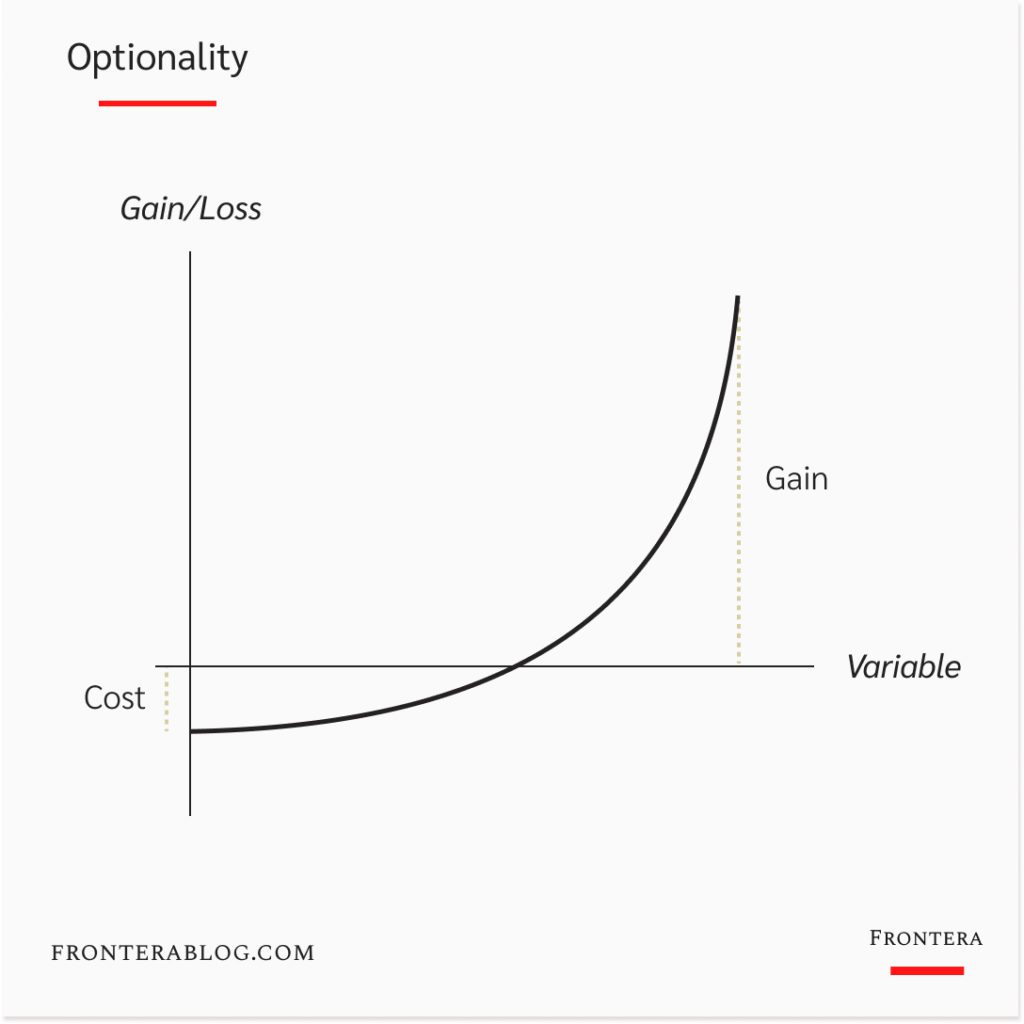Optionality is a mental model to make decisions that create possible unlimited gains with limited costs. Nassim Taleb explains the importance of optionality in his book Antifragile.
In this article, you’ll find a short story to see how optionality works and then three ways to increase optionality in your life.
Is it possible to turn $53,000 into $47,973,000 in one year and a half?
Last year, the world found out it’s possible with options.
Reddit user DeepFuckingValue believed Gamestop was undervalued.
So he bought long options of the stock.
In other words, he bought an “option” to earn money if the stock rises higher than a certain price in the future.
And after some events that can happen once in a lifetime; Gamestop stock didn’t only rise, it went to the moon.
His options had a 167,000% return at their peak.
The story ended up with him taking his profits and a drama that led to a US Congress hearing on Wall Street institutions.
Now, an option (as a financial instrument) is a form of optionality.
And that’s what made DeepFuckingValue rich.
But how does optionality work in other aspects of life?
Nassim Taleb’s Asymmetric Options
An option in life is having the right, but not the obligation, to perform an action.
And optionality is having many options to choose from.
But obviously, not every option is the same.
We can sit and watch Netflix for days, but it doesn’t have any potential return.
A good option should have asymmetry between its cost and potential benefit.
The bigger the asymmetry is, the better the option.
So with optionality, the idea is to have more options with low cost, but unlimited upside.

The future is unpredictable.
In Antifragile, Nassim Taleb explains how optionality reduces your dependence on predictions and information.
Because with an option, you can decide after the events occurred.
Venture capitalists know they can’t predict which startup will be successful.
So they increase their optionality by making small investments in many startups, knowing most will fail.
But when one startup becomes successful —after events occur— they can cash out with exceptional returns.
And the return from a successful startup is usually so big; that it makes the losses from other bets insignificant.
Now, let’s get tactical.
Three ways to increase your optionality according to Nassim Taleb:
1. Build an imbalanced barbell
Nassim Taleb proposes an imbalanced barbell strategy for portfolios (and life) to increase optionality.
It looks like this:
90% cash-like defensive assets. And 10% risky options with unlimited upside.
This strategy has low but guaranteed returns for a long time.
And extremely high —like DeepFuckingValue— when an unexpected event happens.
That’s how Taleb’s strategy had huge returns in the crises of 2008 and 2020.
Because he knows he doesn’t need to predict the next crisis or when it will happen.
But it will happen one year or another, and he will have the options to benefit from it.
So how can you use the barbell strategy besides a portfolio?
Personal:
Have a steady income (a low-intensity 9-5 job or freelancing), but work on side projects with unlimited upside.
That means you are safe with a guaranteed income, but you also create optionality.
Most of your side projects will fail, but one successful project will be enough to change your life.
Business:
Have one product that brings guaranteed revenue. And experiment with new mini products to create optionality.
That’s why companies like Google and Amazon keep making small bets (relative to their size) in new areas besides their core business.
When it fails (like Google+), they move on.
But when it hits (like AWS, Gmail), they win big.
2. Make your bets right
Remember that most of your bets will fail.
So one option shouldn’t cost you a lot of time, money, or effort.
And it shouldn’t bring any risk of ruin.
DeepFuckingValue’s option did have unlimited upside potential, but the cost ($53k) was too high.
Plus, it was for one option — Gamestop stock going higher.
Everything could have easily gone the other way and ruined his finances.
So keep each bet small, and make many bets.
3. Choose options that create more options
Knowing how to code has more optionality than becoming a doctor.
Writing online has more optionality than keeping a private journal.
Because they bring more options with unlimited upside potential.
Yes, going to a party doesn’t guarantee that you’ll find the love of your life.
But you might.
So take high optionality paths with your decisions.
Enjoyed this article?
Then you’ll love the How Brands Win Newsletter.
Get the “7 Positioning Sins That Cost B2B Brands Millions” guide when you join. It’s free.
References:
1. Nassim Taleb, Antifragile: Things That Gain from Disorder
2. The story of DeepFuckingValue & Gamestop short squeeze
